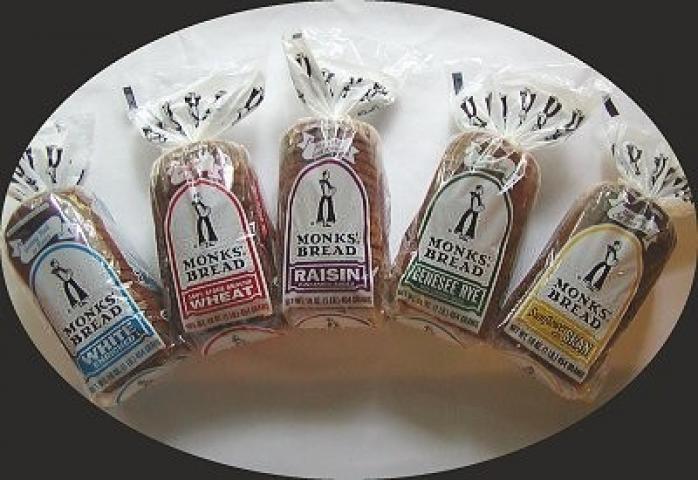
Back at work after a trip to upstate New York to drop Son #1 off to school, I find myself contemplating something that may seem odd: the business secrets of monks. The reason is that while in New York we visited the Abbey of the Genesee, a Cistercian monastery in the rolling countryside south of Rochester. A question posed by Son #2,”Why do the monks bake bread for sale?” led to a column I’m currently writing.
I’ll share that essay with you at a later time, but as I was browsing the web looking for other monasteries that support themselves with small businesses, I came across an article on the Business Secrets of the Trappists from Forbes Magazine (not a publication one typically looks to for spiritual inspiration, I realize). It’s written by August Turak, a businessman and entrepreneur who is a frequent guest at Mepkin Abbey in South Carolina. While he goes there primarily for spiritual reasons, he’s also learned many business lessons from the monks, who operate a business raising chickens and mushrooms. In the secular world such enterprises are typically low-profit and quickly fizzle out, but this monastery’s business is thriving. The answer, Turak writes, is because their business model is based on the sixth-century Rule of St. Benedict, which says that manual labor is an essential part of spiritual development. Writes Turak:
What is most amazing is that all these accomplishments represent the part-time effort of a couple of dozen elderly men living and working together mostly in silence. They attend church services six times a day and spend hours in solitary prayer, contemplation and sacred reading. Because their mission is to live a life of silent contemplative prayer, they work only part time.
All too often our organizations fail to reach their potential because people spend too much time looking over their shoulders. What is so striking about Mepkin is that the monks are never looking over their shoulders. They are passionately committed and totally focused on the task at hand, and they know that their brothers are doing the same. As a result, they are highly efficient and get an enormous amount done in the four hours a day they dedicate to earning their living.
Yet if we allow ourselves to be impressed by the monks because they manage to accomplish so much despite their single-minded dedication to their mission, we make a common but cardinal error. It is because of their focus on mission that they operate a multimillion-dollar business with a degree of frictionless efficiency that would drive most profit-driven executives to distraction with envy. And if we are willing to learn from the monks, our secular corporations can do the same.
As a freelancer whose income is often precarious, I was particularly struck by a line that comes later in the piece: “Every day, regardless of booms and busts in the larger economy, the monks risk their lives and livelihood faithfully serving their principles while trusting that business will take care of itself.” It reminds me of a saying attributed to St. Teresa of Avila: “I take care of God’s business and he takes care of mine.”
While the article focuses on business lessons, it’s clear that the author believes that these pieces of wisdom apply to our larger lives as well. His words on the impact of faith also ring true to me:
One day I asked [the abbot] how he and Mepkin managed to get so much accomplished with so few resources. He smiled and said, “We just trust the process. This is a 1,500-year tradition, and we trust the process.”
Mepkin’s success comes from faith. Not just the kind of faith we usually associate with theological beliefs, but the kind of faith that is implicit in the word faithful. The monks faithfully behave in a way that may not seem entirely rational to the casual observer or even at times to themselves.
Jesus said that if we seek first the kingdom of God, everything else will take care of itself, and that is the kind of faith that drives Mepkin. In a wider sense, the monks attack each and every day with the faith that if they “live the life” of service and selflessness, the necessities of life will somehow be provided.
This way of life is not limited to monasteries, Christians or even believers. The old adage that good things happen to good people is true, and in my own business life I’ve seen it pay off in magical ways. However, the trick that the monks have mastered is that this secret cannot be manipulated. Our faithfulness must be authentic, and our motives pure, if we are to pass the tests of daily life. Paradoxically, it is only when we no longer care about “what’s in it for me” that the formula works.
Over the years, I’ve watched in awe as people from all over the world, from all walks of life, believers and atheists, step forward to help the monks live out their mission. The brothers never ask for this help, yet it seems to flow effortlessly. The secret to Mepkin’s business success is that through faithfulness the monks have learned how to let success happen.
Mepkin’s mood of higher purpose is so seductive that people step forward to help and go away feeling as if they got the better part of the bargain…Faith at Mepkin is not just about theology. It means faithfully living out the mission regardless of where it leads and how scary things get.
It makes one wish these monks were running Wall Street, yes?











